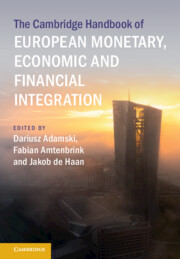Book contents
- The Cambridge Handbook of European Monetary, Economic and Financial Integration
- The Cambridge Handbook of European Monetary, Economic and Financial Integration
- Copyright page
- Contents
- Contributors
- Introduction
- Part I The Economic and Monetary Union
- 1 Conceptual Foundations of Economic and Monetary Union
- 2 Theorizing Economic and Monetary Union
- 3 Monetary Union and the Single Currency
- 4 On the Misalignment of Monetary, Economic, and Political Integration in European Economic and Monetary Union
- 5 Ideas, Interests, and Power
- 6 Coping with Economic Crises through Learning by Doing
- 7 The Political Economy of Reinsurance
- 8 Euro Crises, the Productivity Slowdown, and the EMU
- Part II The Monetary Dimension
- Part III The Economic and Fiscal Dimensions
- Part IV Financial Integration
- Index
- References
4 - On the Misalignment of Monetary, Economic, and Political Integration in European Economic and Monetary Union
from Part I - The Economic and Monetary Union
Published online by Cambridge University Press: 28 September 2023
- The Cambridge Handbook of European Monetary, Economic and Financial Integration
- The Cambridge Handbook of European Monetary, Economic and Financial Integration
- Copyright page
- Contents
- Contributors
- Introduction
- Part I The Economic and Monetary Union
- 1 Conceptual Foundations of Economic and Monetary Union
- 2 Theorizing Economic and Monetary Union
- 3 Monetary Union and the Single Currency
- 4 On the Misalignment of Monetary, Economic, and Political Integration in European Economic and Monetary Union
- 5 Ideas, Interests, and Power
- 6 Coping with Economic Crises through Learning by Doing
- 7 The Political Economy of Reinsurance
- 8 Euro Crises, the Productivity Slowdown, and the EMU
- Part II The Monetary Dimension
- Part III The Economic and Fiscal Dimensions
- Part IV Financial Integration
- Index
- References
Summary
This chapter argues that EMU is characterized by a misalignment of legal, economic, and political integration that is mainly rooted in the asymmetric incorporation of monetary and economic policy in the euro area. The legalization of monetary policy and economic policy coordination has produced a governance framework that cannot achieve monetary dominance as envisaged by the drafters of the Maastricht Treaty. At the same time, this framework also stands for a juridification of politics and the politization of law that has planted the seed for constitutional conflicts between the EU and its Member States regarding the legality and legitimacy of supranational meddling with these policy fields. It is argued that the key to addressing the root cause of the problems lies in a substantive reorientation of EMU that entails a substantive realignment of economic policy with monetary policy in the euro area and the reinforcement of the democratic legitimacy of supranational policy-making in both policy fields.
- Type
- Chapter
- Information
- Publisher: Cambridge University PressPrint publication year: 2023

